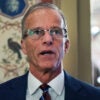CLEVELAND—Early Monday morning when Boyd Matheson proposed radically shortening the Republican Party’s platform, reporters in the press pen snickered. As the platform committee dragged into the night, they groaned.
After considering hundreds of amendments and several dozen pages of policy for more than 12 hours straight, Matheson, a Utah delegate to the Republican National Convention, chuckled.
“No normal American is ever going to read anything that’s in that platform,” Matheson said in an interview with The Daily Signal.
That’s why he introduced a resolution to transform the document from a comprehensive policy paper into a short statement of principle.
The platform committee—made up of two delegates from each state, protectorate, and the District of Columbia for a total of 112—drafts the vision statement of the Republican Party during a quadrennial exercise at each national convention.
The document stakes out the party’s official line on domestic and international issues. Past platforms have spanned more than 90 pages of talking points.
This year the platform committee has considered the party’s position on everything from pornography to prairie chickens. And, Matheson says, it doesn’t matter:
This is the ultimate tree falling in the forest. It doesn’t matter how loud the noise is if nobody can hear it. If you can’t have a conversation about it around the kitchen table, then it’s not moving the needle for anybody.
Instead, Matheson wants Republicans to act like it’s 1860, when the party drafted a simpler, 1,200-word platform for Abraham Lincoln to run on. Rather than a vast collection of policy proposals, he says, the GOP should draft a concise statement of principles.
If millennials can send tweets with less than 140 characters, he quipped, Republicans should be able to craft a vision in fewer than 30,000 words.
Matheson seems to be winning converts to his position. Some delegates complained openly about the length and complexity of the document as the committee proceeded Tuesday morning.
“We’re gaining a lot of momentum through the process,” Matheson told The Daily Signal. “There have seriously been a lot of people who have come over and said, ‘You’re right. This isn’t what we’re about and this isn’t at all helpful to the cause.’”
Politicos and headlines have generated much hullabaloo about the party platform. It has taken on increased significance to some in light of Donald Trump’s looming nomination.
Some see the platform as an opportunity to tether the presumptive nominee—who has notably split with Republican orthodoxy on matters including abortion and free trade—to a conservative policy vision.
That’s counterproductive, argues Matheson, who formerly served as chief of staff to Sen. Mike Lee, R-Utah, noting that the platform is purely aspirational and nonbinding.
He said, “I would dare say that almost all people who have sat in the Oval Office never even read [their party platform]—let alone were dedicated to accomplishing it.”
Trump campaign officials have indicated that they’ll take a hands-off approach during the writing process and embrace the final draft.
Differences among conservatives, libertarians, and the party’s presumptive nominee bolster Matheson’s original argument, he insists.
“We often disagree on strategy, and tactics—we can be all over the map,” he told colleagues Monday. “This is a good thing. It’s part of what makes the GOP unique. … The defining thing is not what we disagree on, but what we agree on: the principles.”
































